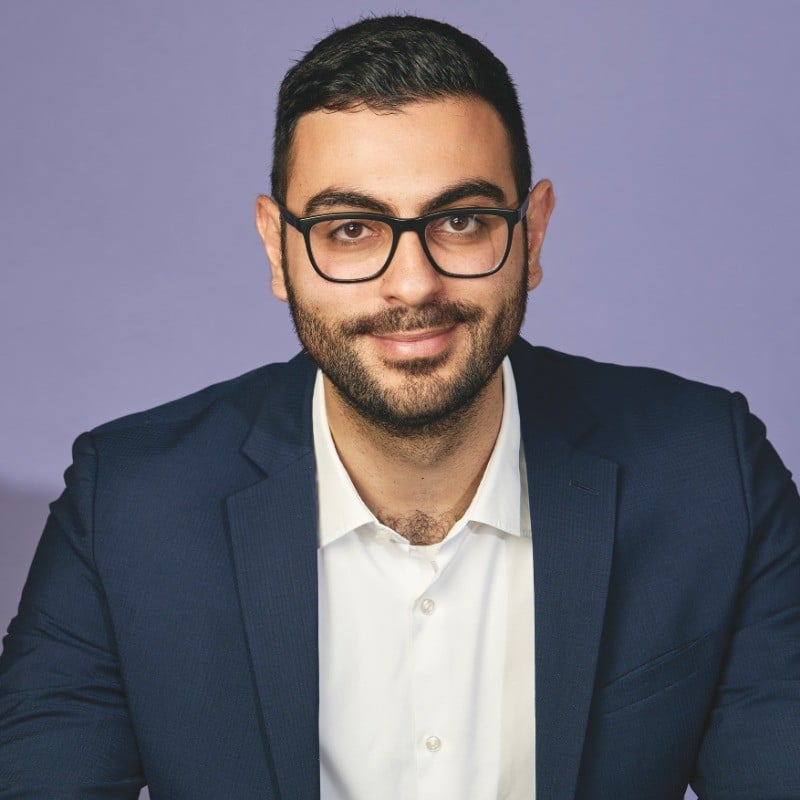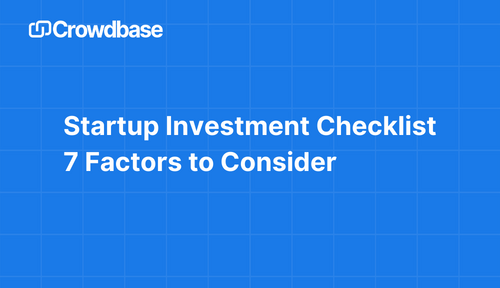Moving Doors: Live Q&A Overview

Frixos Larkos
Co-Founder & CEO

We recently hosted an exclusive live Q&A session with the CEO and COO of Moving Doors, where you had the chance to get your questions answered directly by the founders.
Below is a comprehensive overview of the insightful questions and answers from that session.
Question 1
How does a convertible loan work? When will it convert into equity? And what are the specifics of the convertible loan agreement?
Answer: A convertible loan is a loan with a specified interest that rolls over yearly, meaning the interest is added to the principal instead of being paid out. This loan converts into equity in the future.
The conversion usually happens during a funding round. For example, a Series A round might close at €5 million with a €30 million valuation. The company's valuation is often based on expected revenue, around 1 to 1.5 times the expected annual revenue. Current investors might join at a discounted valuation of €15 million, expecting it to rise to €30 million by Q1 or Q2 of 2025, depending on performance and investor interest. This effectively doubles the investment for early investors.
Question 2
Since you mentioned the expected revenues for 2025, what is it? How is it looking for 2024?
Answer: Currently, we have 253 operational apartments in Cyprus and 15 in Dubai. By September, we aim to have 345 operational apartments in Cyprus and 25 in Dubai, totaling 370 units. Our target is to reach 450 apartments in Cyprus and 50 in Dubai, totaling 500 units.
This translates to approximately €9 million in revenue from Cyprus and about €0.5 million from Dubai, totaling €9.5 million for 2024. These estimates are accurate within ±2-3% due to signed contracts and pipelines.
Currently, we have €563,000 in monthly recurring revenue, expected to rise to €650,000 by September with new operational units.
Question 3
What are you seeing on the demand side of things?
Answer: Demand is very strong with an average occupancy of 95% in Cyprus. In Dubai, occupancy drops to 80% in summer and rises to 95-96% in winter. High occupancy rates can be maintained with dynamic pricing. Our main challenge is acquiring supply at reasonable prices. Competitors have around 92% occupancy globally, and with proper pricing models, maintaining high occupancy is achievable. The real challenge is maintaining high gross profit margins, which depends on acquiring units at good prices.
Question 4
Who determines the valuation of the next conversion event?
Answer: Valuation is based on comparable transactions and multiples of expected 12-month revenue, typically ranging from 1 to 1.5 times. For our expected revenue of €25-30 million in 2025, we anticipate a post-money valuation of €30 million. This valuation will be negotiated with institutional investors. We already have verbal commitments for €3 million out of the €5 million needed, indicating strong interest for Q1 2025.
Question 5
How dependent is Moving Doors on commercial clients like Exness?
Answer: Our B2B segment is 20% of our portfolio, compared to larger players with 50%. We have many commercial clients, including Samsung and Exness. Even if a major client exits, we can fill apartments within two days, often at higher rates. Commercial clients provide credibility and cash flow benefits, but B2C generally offers better gross profit margins. Thus, we do not face significant risk from losing a large corporate client.
Question 6
Do you have issues with tenants not paying? How do you handle bad debts?
Answer: We offer tenants the option to prepay, but defaults are handled strictly. We send payment reminders three days before, on the due date, and three days after. Seven days later, an eviction letter is sent, and tenants have 24 hours to vacate. We hold two deposits to cover potential losses and damages. If tenants do not pay, we turn off utilities and evict by the 15th day. This process ensures we cover losses, and we've never lost money on evictions.
Question 7
What about the law?
Answer: We don't use lease agreements but bookings, treating tenants like short-term guests. This means they don't have tenant rights. Our contracts specify that if rent is delayed by three days, we send a reminder. If delayed by 15 days, we can change the locks and switch off utilities.
Question 8
Do you plan to expand into other services like office design, marketing agency for independent landlords, or renting agency?
Answer: Currently, we are focusing on vertical expansion rather than horizontal. Ancillary services like furnishing bundles and professional cleaning are in demand, but we consider them operational hassles at this stage. We might explore these opportunities in the future, perhaps in two to three years.
Question 9
Can you tell us about your newest project, the Midas project?
Answer: The Midas project consists of 47 units in Zakaki, Limassol, near the casino. We secured a favorable long-term lease with the developer Singularis from Larnaca, who sold many units to Chinese clients, including furnishings, reducing our capex to under €100,000. The building is nearly ready, pending EAC connection, and all 47 apartments should be operational within seven days.
Question 10
Do you upload the apartments on the website the day they become operational?
Answer: We usually advertise with indicative images a few days before the delivery date if the project isn't ready to showcase. We gather leads and convert them. For the Midas project, we have a showcase apartment set up for a photo shoot, and we use its photos to start getting conversions.
Question 11
What is the expected return on investment for the Midas project over the next five years?
Answer: With a cost of €100,000 for 47 apartments, the average cost per apartment is around €2,000, including only minor furnishings. Typically, we spend about €10,000 per apartment and recoup capex in 8-9 months. For this project, we expect to recoup the investment with the first booking, as we receive two deposits plus one month’s rent upfront. This deal significantly improves our return on equity compared to usual projects.
Question 12
How does the process and market for the Dubai project compare to Cyprus?
Answer: The unit economics in Dubai are similar to Cyprus, but Dubai is more competitive and seasonal. Agents in Dubai, often controlling many properties, make it challenging to secure long-term leases as they prefer short-term arrangements for higher commissions. Despite this, Dubai has a larger and constantly growing supply, which makes scaling easier, though competition remains high. In Cyprus, we negotiate directly with landlords and manage a more straightforward process, while in Dubai, navigating agent interests and competition adds complexity.
Question 13
Do you handle maintenance and renovations in-house or outsource them?
Answer: We don't do major renovations; we handle movable items like curtains, lighting, and furniture. For maintenance, such as air conditioning and repairs to electrical appliances, we use outsourced professionals like electricians and plumbers.
Question 14
If I have an old apartment and want to list it on your website, but it doesn’t meet your requirements, can I still collaborate with you if I renovate it myself?
Answer: Yes, if the apartment doesn’t meet our requirements, we can still collaborate if you handle the renovation yourself. We’ll agree on the price for a renovated apartment, and once it's done, we’ll furnish it, add the FF&E, and operate it. We don’t manage the renovation project.
Question 15
How do you define a "reasonable" price for leasing apartments in Limassol, given that prices there are high?
Answer: A reasonable price means the landlord benefits from a hassle-free experience. We handle all aspects of renting, including maintenance, tenant communication, and rent collection. In exchange, we negotiate a lower rent, such as €800 instead of €1,000, providing the landlord with consistent, long-term occupancy without the need for frequent renewals or handling issues. This lower rent compensates for the comprehensive service we provide.
Question 16
What about expanding to more touristic areas like Ayia Napa, Paphos, and Larnaca?
Answer: We are expanding into Paphos and Larnaca but focus mainly on Limassol due to the high demand from international, high-tech employers. Touristic areas like Ayia Napa and Nicosia have less demand from such employers, and locals are less likely to pay a premium for fully furnished, hassle-free rentals. Thus, our efforts are concentrated where there is higher demand from expatriates and high-income workers.
Question 17
Who monitors the real estate market trends in your company?
Answer: Diana, our head of commercial and data analyst, handles this. She previously worked at Campbell and oversees market trends by analyzing data from various sources, including scraping data from Bazaraki.
Question 18
Which new markets are you exploring?
Answer: We’re exploring Saudi Arabia due to its potential similar to Dubai. We’re also looking into Athens because we have local support there, and Poland and the Czech Republic due to favorable unit economics and market conditions. Poland is especially promising with significant migration from Ukraine, increasing housing demand in cities like Warsaw and Krakow.
Question 19
Are there opportunities with the AUB University in Paphos, particularly for student housing?
Answer: We don't see it as a key opportunity. While increased demand for Paphos accommodation is beneficial, our business model isn't focused on student housing.
Question 20
What are the potential exit strategies for the company?
Answer: Potential exits include selling to a larger competitor or private equity fund, or being acquired by a major hospitality brand like Marriott. An IPO is a possibility but unlikely in the next five years. The market has well-capitalized competitors, which increases acquisition potential. To be attractive for an exit, we need to reach around 1,000 to 1,500 units, ideally in three countries. We're expanding into Saudi Arabia, Poland, and the Czech Republic to gain first-mover advantages similar to our initial success in Cyprus.
We hope you found this insightful and perhaps found some answers you were looking for!
Crowdbase Team
More from Crowdbase
Discover more from our blog, guides and moreDon't miss the next opportunity
Sign up for our newsletter to be the first to know about new campaigns, updates and more!






